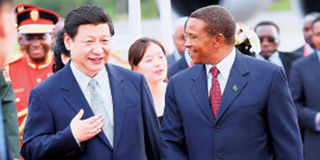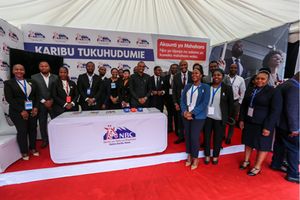TZ diplomacy peaks despite economic gap

President Jakaya Kikwete with China President, XI Jinping during his official visit to the country. PHOTO|FILE
What you need to know:
- Over the decades, the West has had to work immensely hard to spread their influence in the continent, but China broke the status quo
Dar es Salaam. If anybody doubted Dar’s status in the world diplomacy, year 2013 has probably got them thinking. The super powers’ rush to win the country’s friendship was historic and the gamble to secure cozy relations was ecstatic
And this time around, the fairy-tale wasn’t so traditional. Over the decades, the West has had to work immensely hard to spread their influence in the continent. But it was the Asian giant, China, which moved first to break the status quo.
Barely half way through the year, and just few months since his reign in World’s second super power, President Xi Jingping in April, chose Tanzania for his second foreign trip after Russia. And nobody questioned that the trip was not a mere coincidence.
Speaking to this writer in Beijing, the Chinese Professor quipped “Xi’s visit made Tanzania a cute girl that all the world’s big brothers want to make their sweetheart,” a view pretty widely supported
Ahead of the trip, the president said “China-Africa cooperation is comprehensive”, adding that Beijing valued “friendly relationships with all African countries, no matter whether they are big or small, strong or weak, rich or poor”.
When he arrived in Dar, Xi proved just how China really means business. He signed 17 contracts, among which included the three year Economic and Technical Cooperation worth $800m (Sh1.8trn) aimed at implementing various projects.
Another agenda on the table was the declaration of his country’s intention to construct a multibillion dollar Bagamoyo port rated the biggest in east and central Africa.
A couple of months later, the world learnt the big powers were not yet done with Tanzania. The President of the United States Barack Obama jetted in. From mopping up the road, to removing beggars from our streets to repairing dozens of city roads and posting the statesman’s photos in almost all city road poles, the drama accompanied by this statesman’s visit will go down in history as one of a kind.
Obama’s trip was largely concluded as an effort to erase his Chinese counterpart’s footprints, with others suggesting it was simply a sign of just how much Tanzania matters in the global environment, and how it remains the East Africa’s reliable partner, mainly due to its predictable political atmosphere.
In his briefcase, the he came with the Power Africa agenda. Basically, the ambitious initiative targets to have all Sub-Saharan Africans access electricity by 2030. Obama put $300 billion to be used among six countries (Kenya, Ethiopia, Ghana, Liberia, Tanzania and Nigeria), with the promise that each recipient would receive $7billion over the next five years. While it was all jolly here at home, neighbouring Kenya did not share the sentiments.
The disappointed Obama’s distant ‘family’ took out their frustration on web pages and social media in particular, and trashed Obama’s snub to their country as something they really didn’t care about.
Whether these trips meant more to the visitors than the hosts remains understandably debatable. But that it placed Tanzania at the good side of world diplomacy, and that the visits speak volumes of Tanzania’s geopolitical importance and its abundant lucrative resources is indisputable
However, the government can in no way deny the fact that the current foreign policy, dubbed as ‘economic diplomacy’, is yet to yield the desirable fruits that it should. Especially, if one considers opportunities that foreign partners have already made rather easily accessible if not fully available.
Taking China for instance, there are hundreds of Chinese nationals today making fortunes in Tanzania with businesses ranging from selling chai in Kariakoo streets to motor vehicles all over Mikocheni area to road construction projects.




